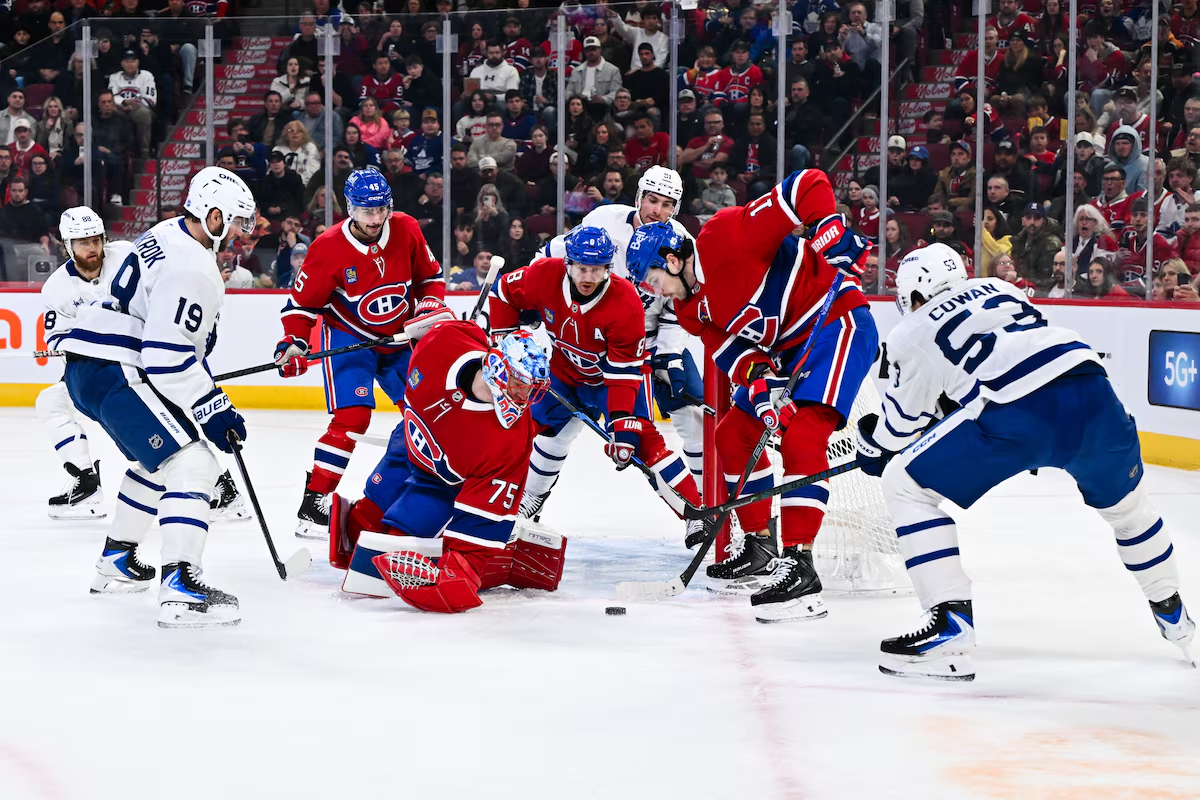The mythology of the NHL’s Atlantic Division is collapsing

Open this photo in gallery:
Saturday night’s Leafs-Canadiens game wasn’t the clash of hockey heavyweights fans were hoping for. Both teams brought losing streaks into the game, and the Canadiens added to the Leafs’ woes with a 5-2 win.Minas Panagiotakis/Getty Images
Six weeks ago, you’d have circled Saturday night’s game on your calendar. The Leafs in Montreal – a bellwether for how things were developing in the Atlantic. Toronto would be there representing the establishment in hockey’s hardest division, while the Canadiens stood in for youth and change. Who was rising and who was falling?
Instead, what you got were two flailing clubs trying to hang on to one another to avoid drowning. The Canadiens took an unassailable four-goal lead, then spent most of the back half of the game inviting Toronto to assail it. The Leafs couldn’t manage it.
It ended 5-2 Montreal, breaking that club’s five-game losing streak. The Leafs have lost seven of eight. It’s early, but it’s not that early. Neither club looks ready for the afternoon slot, never mind prime time.
It’s like this all over the Atlantic. The Florida Panthers are treading water (they got blown out on Saturday night by the Oilers). Tampa’s having a nice run, but that follows another one of their standing starts. Detroit somehow leads the division, having given up more goals than they’ve scored.
Per tradition, the Buffalo Sabres are hopeless, but they’re also right there. One weird week and they could jump into the divisional lead. The really strange thing about this year is that you could envision it actually happening.
Cathal Kelly: The Leafs’ disconnect isn’t just on the ice
It’s like that up and down the division. Nobody’s got much offence or much defence. Nobody’s winning and, thanks to the NHL’s goofy points system, no one’s really losing either.
This is the division that’s produced eight Stanley Cup finalists in the last seven years (thank you, COVID) and four winners. Now it’s the Goldilocks-after-a-bender division. Not too hot, not too cold, but definitely not just right. Kind of just lying there on the couch, existing.
For all the talk about parity, the NHL has been ruled for a decade by a small cabal of east-coast teams in the Atlantic – Florida, Tampa, Boston and Toronto.
Every year, there is a dark horse in the west, or someone coming out of the middle of the continent who will surprise you. Your Colorados, Dallases and Las Vegases get their props, but nobody knows them. Not in the same way that you, a person who watches no regular season Panthers’ games, have strong feelings about all of Florida’s goony forwards and its poetic head coach.
Open this photo in gallery:
Edmonton Oilers defenceman Mattias Ekholm (14) defends a shot on goal by Florida Panthers left wing Brad Marchand (63) during Saturday’s game. The Panthers fell 6-3 to the Oilers.Lynne Sladky/The Associated Press
This is a geographic consequence of the way hockey is followed. Most of the fans are in the northeast, and nearly all of the media.
Canadians don’t read about, care about or watch American hockey teams until they are playing Canadian ones. Once a great Canadian player moves south, he gets fuzzy (like, what is Mitch Marner doing now?). It’s the one culture spot in which we have a pompous disregard for the U.S.A.
This north and east bias pushed Toronto and the teams in its way to the top of the general discussion for an unnaturally long time. Each of these four teams was lucky in the draft, but more importantly they were smart in their self-promotion. All of them became prototype franchises.
At different times, everyone wanted to be as mature as Boston, or as talented back to front as Tampa, or as glamorous as the Leafs and now as ruthless as Florida.
Each one is measured against the others. Tampa falls because Florida rises. The Leafs finally have a chance because Boston’s easing up. It was broadly assumed that whomever came out of this quartet would win the Stanley Cup, even if that didn’t always happen. But it did happen a lot.
Canadiens snap five-game skid with 5-2 win over the Maple Leafs
The Leafs weren’t bad because they weren’t good enough. They were bad because Tampa was too good, and then Boston, and then Florida. It wasn’t their fault. Winning in the Atlantic was an unfair ask. You may not believe it, but the players do. That’s why the Leafs come out after every playoff letdown and shrug. Tampa and Florida? Like, think about what you’re asking us to do, man.
Until six weeks ago, it was assumed that the pattern would hold again. Not for any good reason. Mostly via inertia. You don’t take your money off the table when the streak’s still going.
It’s very possible that the Atlantic produces another Stanley Cup finalist.
Tampa has spent the last three years napping, despite maintaining their veteran, superstar core. Florida may not have the horses, but they have the self-belief. Boston, who knows, and the Leafs, who cares.
Open this photo in gallery:
The NHL’s Central Division, where Colorado Avalanche centre Nathan MacKinnon (29) has helped his team to a 15-1-5 start, could be the toughest in the league now.Isaiah J. Downing/Reuters
But however that ends up, the mythology of the Atlantic is collapsing. Nobody thinks this is the division likeliest to produce a contender. That would be the Central, because that’s where Colorado and Dallas work.
This year’s playoffs will take place in the afterglow of the Milan Olympics. If this country wins it – or even better, loses a close one – Nathan MacKinnon, Cole Makar and Devon Toews will make the Avalanche a proxy Team Canada.
You know who’s going to be missing from that patriotic steamer? The Leafs. Some teams descend gracefully from the top of the discussion. The Leafs are coming down backward and at speed. After every loss, you can hear a crunch.
If the Leafs are bad again, does the Atlantic matter? Will talk radio obsess about Tampa’s chances if the Leafs have none? I doubt it. It’s time to find new teams and new discussions, at least in terms of who’s in with a chance.
The Canadiens were meant to be that team this year, but the early signals are not great. Ottawa has some of the results, but none of the elegance.
So I guess it’s time for Connor McDavid to strap on his weighted backpack, shove all of his teammates in there and go on another run up the standings. The guy is only 28, and no wonder he always looks tired.
As for the Atlantic, it was a great run. It produced a lot of feelings, some good, mostly bad. But for every division, there is a season and 2025/26 ain’t it.





